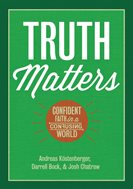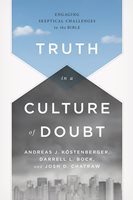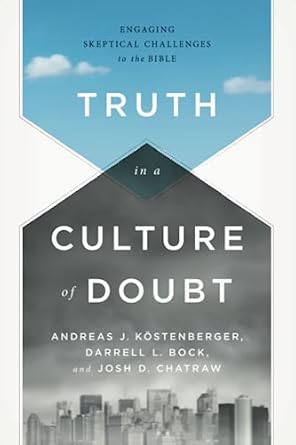We have already expressed our excitement and appreciation for the work of Darrell Bock, Andreas Köstenberger, and Josh Chatraw in exposing the flaws in the relentless arguments of Bart Ehrman against Christianity. Coming up now in September B&H is scheduled to release their latest: Truth in a Culture of Doubt.
We have been very impressed with the quality of their work, and we are grateful for this important service to the church. Today we are very pleased to have Dr. Andreas Köstenberger here to speak with us about their latest work.
 Books At a Glance (Fred Zaspel):
Books At a Glance (Fred Zaspel):
Your book treats and answers various attacks that have been advanced against the Christian faith by Bart Ehrman. For those who may not be familiar with him, tell us about him and why he merits your attention.
Köstenberger:
Bart Ehrman is a prolific and charismatic teacher and writer who has made it his mission to discredit the Bible and the Christian faith. He is chair of the religion department at UNC-Chapel Hill and has written bestselling books such as God’s Problem, Jesus, Interrupted, and, most recently, How Jesus Became God. Ehrman has a “testimony” of moving from faith to skepticism which he shares every chance he gets. He started out at Moody Bible Institute and then went to Wheaton. From there he moved on to Princeton, where he discovered that there are mistakes in the Bible. He subsequently found more and more such “errors” and came to doubt even the existence of God (calling himself an agnostic). In his many publications, he has gone on record alleging that the Bible has been corrupted by incompetent copyists and that there are numerous contradictions in the Gospels and the rest of Scripture. His book sales are in the millions, and every year he teaches hundreds of college freshmen introductory courses on the New Testament and the Bible, so his influence on impressionable young minds is considerable.
Books At a Glance:
Whom did you have in mind in writing this book? Who is your intended audience?
Köstenberger:
Let me start with an anecdote. A few years back, I went to a debate between Bart Ehrman and Dallas professor and New Testament scholar Dan Wallace on the UNC campus. The debate was in the biggest auditorium on campus, holding a standing room-only crowd of about 800 young students – and the subject was textual criticism! As I sat listening to the debate, it occurred to me that while Dan Wallace for the large part had the substantive evidence on his side, Ehrman often presented his arguments in a way that was rhetorically more  effective. As I left that evening, I agonized over how those of us who believe God exists, the Bible is true, and Jesus is God could communicate these truths in ways that are more persuasive to the younger generation. The result is Truth Matters, written mostly for high school and college students and their parents, and now also Truth in a Culture of Doubt, written for those who want even more detailed evidence for the truthfulness of the Bible and Christianity.
effective. As I left that evening, I agonized over how those of us who believe God exists, the Bible is true, and Jesus is God could communicate these truths in ways that are more persuasive to the younger generation. The result is Truth Matters, written mostly for high school and college students and their parents, and now also Truth in a Culture of Doubt, written for those who want even more detailed evidence for the truthfulness of the Bible and Christianity.
Truth in a Culture of Doubt, in particular, is written primarily for believers who want to be equipped to defend the faith more knowledgeably. It is also designed for non-Christians who would like to learn more about God, Jesus, and Scripture and who are open to being engaged in serious discussion about these important issues.
 Books At a Glance:
Books At a Glance:
How is your Truth in a Culture of Doubt book related to your earlier book, Truth Matters, and how would you suggest they should be used?
Köstenberger:
I would describe Truth Matters as an entry-level text on key issues such as why God allows suffering (not that we have all the answers!), why we can trust the Bible because it is true, coherent, and well preserved, and so on.
I’m working through the book with my 17 year-old son, who is a rising high school senior, right now. He’s reading the individual chapters, and after every chapter he and I sit down to discuss any questions he might have, etc. It’s a great way to engage a young person’s thinking and to help them learn how to deal with personal doubts they might have as well as to equip them to deal with objections to the faith they are sure to hear in college, whether from roommates or friends or from their professor in the college classroom.
In addition to the book, LifeWay also produced an excellent set of materials that can be used in conjunction with Truth Matters for small group discussion, whether by campus organizations, church youth groups, or parents with their high school or college-age children. Then, as mentioned, Truth in a Culture of Doubt is an ideal resource for those who want to dig even deeper after they’ve gone through Truth Matters, to deepen their understanding of these often complex issues still further. In Truth in a Culture of Doubt they can discover even more detailed evidence and arguments including resources for further study on their own.
Books At a Glance:
In dealing with “the problem of evil” in your book, you insist that before this is a problem for God this is a problem for Bart Ehrman himself. Could you explain this for us?
Köstenberger:
Well, to say that “God has a problem” is of course hopelessly arrogant. God has a problem?!? That’s the creature shaking its fist in the face of the almighty Creator. Arguing that God has a problem is a preposterous, completely backwards way of putting things. The fact is, humanity rebelled against the Creator, and in many ways is reaping the consequences. The problem is not God, it is human sin.
Now, of course, as we say in the book, the reasons for human suffering are much more complex. Many times we suffer because we’ve made bad decisions. Other times we suffer because of bad decisions made by others (including our parents, friends, or others) or in some cases because of persecution. There are still other times where we won’t know why suffering comes our way on this side of heaven. For now, it’s a mystery, and we must choose to trust God in the midst of our suffering, like Job did in the Bible. After all, if we knew all the reasons why we suffer, it’d no longer be faith, right?
*Note: Go here for Part 2 of our interview with Dr. Köstenberger about Truth In a Culture of Doubt, co-authored with Darrell Bock and Josh Chatraw.

